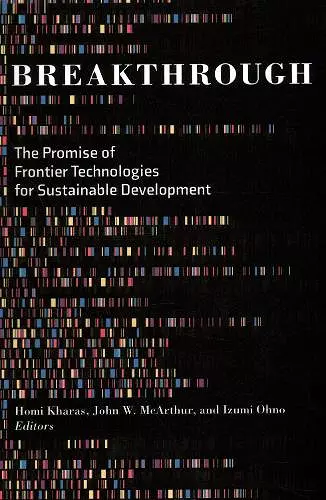Breakthrough
The Promise of Frontier Technologies for Sustainable Development
Homi Kharas editor John W McArthur editor Izumi Ohno editor
Format:Paperback
Publisher:Bloomsbury Publishing PLC
Published:25th Jan '22
Currently unavailable, and unfortunately no date known when it will be back

One overall takeaway is that gradualist approaches will not achieve those goals by 2030. Breakthroughs will be necessary in science, in the development of new products and services, and in institutional systems. Each of the experts responded with stories that reflect big ambitions for what the future may bring. Their stories are not projections or forecasts as to what will happen; they are reasoned and reasonable conjectures about what could happen. The editors’ intent is to provide a glimpse into the possibilities for the future of sustainable development.
At a time when many people worry about stalled progress on the economic, social, and environmental challenges of sustainable development, Breakthrough is a reminder that the promise of a better future is within our grasp, across a range of domains. It will interest anyone who wonders about the world’s economic, social, and environmental future.
Focusing on UN Sustainable Development Goals (SDGs)—ending poverty, malnutrition, deforestation, and climate change—Kharas, McArthur, and Ohno ask what key ingredients produce nonlinear breakthroughs. They argue that a gradualist approach will fail and that exponential progress comes only with better policy and politics as well as technology. The book's 12 chapters draw on more than a dozen authors with expertise in science, business, civil society, and policy making. Overall, they find that best practices for innovation include user-centered design, understanding the context and concerns of affected communities, smart risk-taking, designing for scale and sustainability from the start, and collaboration. Chapter 4 examines utility-scale solar power, finding it nearly free as costs lie with battery storage and metering rather than with the electrical power itself. Chapter 7 targets smallholder agriculture with the maxim "think big, act fast, start small" to help improve agronomic decisions regarding activities such as fertilizing, watering, and harvesting. Chapter 9 explores "smart cities" as more than just a venue for showcasing new technology, from transportation to utilizing sensors for collecting large data sets for AI analysis. Throughout, contributing authors rightly recognize that new breakthrough technologies risk primarily benefiting the world's wealthiest, further exacerbating inequities borne by poor and rural populations. Highly recommended. * Choice Reviews *
ISBN: 9780815739654
Dimensions: 224mm x 156mm x 17mm
Weight: 372g
256 pages